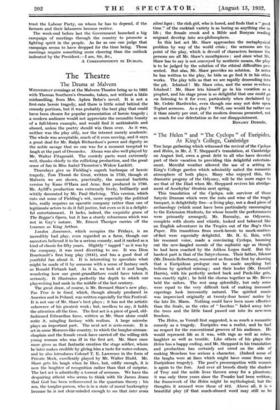" The Helen " and " The Cyclops " of
Euripides. At King's College, Cambridge
THE large gathering which witnessed the revival of the Cyclops and Helen, in Mr. J. T. Sheppard's translation, at Cambridge on August 2nd, owes a great debt to all who have devoted part of their vacation to providing this delightful entertain- ment. Merciful weather allowed the use of a setting in King's College garden which admirably suited the romantic atmosphere of both plays. Many who enjoyed this, the dramatic progeny of the Odyssey, will be the more eager to see that of the Iliad when Mr. Sheppard revives his abridge- ment of Aeschylus' Oresteia next spring.
This translation of the Cyclops, sole survivor of those Satyric Dramas which were the nuts and wine of the tragic banquet, is delightfully free—a living play, not a dead.piece of archaeology (which must have been particularly encouraging to the Extension Students, for whose benefit the performances were primarily arranged). Mr. Burnaby, as Odysseus, complete with shorts and whistle, looked and behaved like an English adventurer in the Tropics out of the .Boy's Own Paper. His transitions from mock-heroic to mock-matter- °Matt were especially delightful. Mr. R. G. Ildn, with his resonant voice, made a convincing Cyclops, booming out the new-fangled morals of the sophistic age as though he had been coached by the Adikos Logos itself. But the hardest part is that of the Satyr-chorus. Their father, Silenus (Mr. Dennis Robertson), reassured us from the first by showing that a Euripidean prologue can be made anything but tedious by spirited miming ; and their leader (Mr. Donald Harris), with his perfectly arched back and Puck-like grin, was exactly right ; he held the chorus together as Mr. Heves held the sailors. The rest sang splendidly, but only some were equal to the very difficult task of making incessant caperings look incessantly natural. The spirited music was improvised originally at twenty-four hours' notice by the late Dr. Mann. Nothing could have been more effective than the finale, as the cries of " Iacchus " faded away into the trees and the little band passed out into its new-won freedom.
The Helen, as Verrall first suggested, is as much a romantic comedy as a tragedy. Euripides was a realist, and he had no respect for the conventional grooves of his audience. He would represent life as it was, with rags as well as robes, laughter as well as trouble. Like others of his plays the Helen has a happy ending, and Mr. Sheppard in his translation and production has certainly not erred on the side of making Menelaus too serious a character. (Indeed some of the laughs were at lines which might have come from any Euripidean tragedy). The poet's preoccupation with women is again to the fore. And over all broods dimly the shadow of Troy and the noble lives thrown away for a phantom; it was only three years since the Troades had been written ; the framework of the Helen might be mythological, but the thoughts it aroused were those of 412. Above all, it is a beautiful play (if that much-abused word may still so be used), and this side of it is much enhanced by the plaintive music of Mr. Guy Warrack. Again the singing was excellent, especially that of the leader of the chorus. Mrs. Prior, as Helen, though at times she seemed slightly uncomfortable, sustained her difficult part with great skill. She was best when she was being artful. Menelaus, slightly unheroic in the Iliad, has in the Helen unmistakably set foot on the path which has ultimately brought him into the repertoire of George Robey. Still, he remains the hero, and Mr. Beves tactfully avoided allowing the comedy to go too far. Mr. Arthur Marshall, as Theonoe, looked impressive and myster- ious ; he successfully brought off her great moment, the decision to aid the fugitives, but spoke his lines a trifle too fast at times. In this last respect Theoclymenus (Mr. G. W. H. Rylands) was best of all, and he looked a fine princely figure in the torchlight. Only his friends will have found it difficult to believe that he could be so naive. Altogether it was a charming performance, none the worse for its informal































 Previous page
Previous page